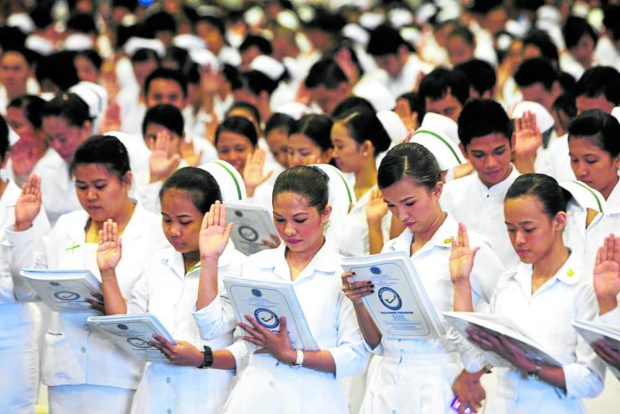Nursing licensure exam passing rate up from 60% to 74% — PRC

File photo shows new registered nurses taking their oath. (INQUIRER)
MANILA, Philippines — The passing rate of the nursing licensure examination climbed to 74 percent from an average of 60 percent over the last six years, the Professional Regulation Commission (PRC) said on Thursday.
PRC Commissioner Jose Cueto Jr. said the two consecutive licensure examinations conducted in November 2022 and May 2023 recorded an average passing rate of 74 percent.
“Ito pong huling [exam] 14,000 po yung kumuha, 10,764 yung pumasa. Ang passing percentage ay 74.94 percent. Itong November 2022 at May 2023 parehong 74 percent,” Cueto said in a public briefing.
(Around 14,000 took the last exam, and 10,764 passed. The passing percentage is 74.94 percent. The passing rate in November 2022 and May 2023 is both 74 percent.)
Article continues after this advertisementHe added that PRC did not expect this uptick since educational institutions, universities and schools nationwide switched to online or blended learning at the height of the COVID-19 pandemic in 2020.
Article continues after this advertisement“Pero kung titignan natin for the last six years ang average po ng passing percentage ay 60 percent out of 113,000 examinees almost 70,000 pumasa,” Cueto said.
(But if we look closely during the last six years, the average passing percentage is 60 percent out of 113,000 examinees, almost 70,000 passed.)
Nurse shortage
Despite the passing rate increase, however, Department of Health (DOH) Secretary Teodoro Herbosa earlier said that the Philippines is still experiencing a shortage of healthcare workers.
Hence, Herbosa proposed to employ unlicensed nursing graduates in government hospitals or those who failed the board exam, with scores ranging from 70 to 74 percent.
In response, Cueto earlier said that they would coordinate with the DOH and Department of Labor and Employment (DOLE) in formulating rules to accommodate Herbosa’s plan, as well as drafting a concept paper, which covers the responsibilities and safety measures of unlicensed nurses who will be employed in public hospitals.
Cueto assured that under Herbosa’s plan, unlicensed nurses would be supervised by registered nurses and would only be allowed to handle less risky patients or simple tasks.
“May mga quality assurance mechanism. Babantayan sila lahat ng gagawin nila ipapaalam nila dun sa supervisor nila so dahil ang number one na layunin ng healthcare workers ay pangalagaan ang patients’ safety and welfare,” he said.
(There will be quality assurance mechanisms. Everything they do will be monitored, and they will inform their supervisor. The number one priority of healthcare workers is the safety and welfare of patients.)